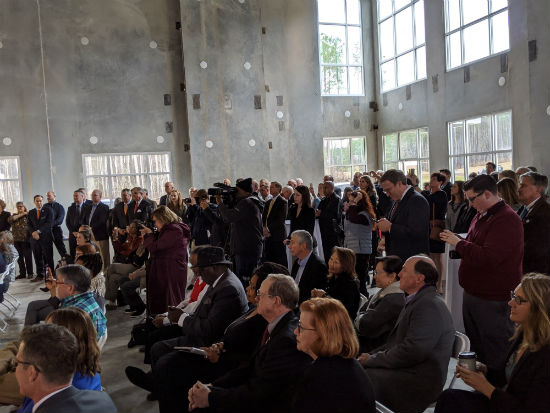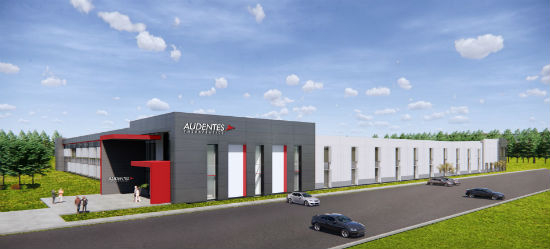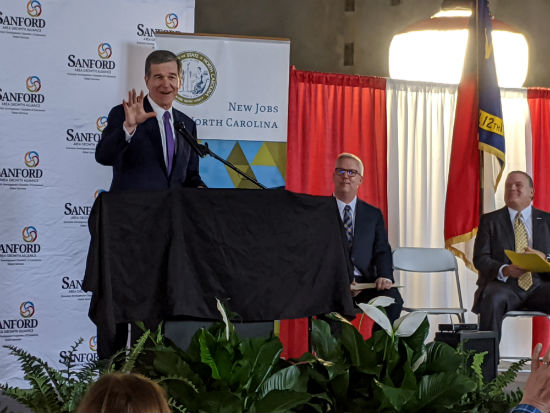
Audentes Therapeutics Unveils $110M, 209-Job Gene Therapy Facility in Sanford

[Editor's note: The company's name was officially changed March 31, 2021 to Astellas Gene Therapies.]
North Carolina scored another major win today in the gene therapy leadership race.
Audentes Therapeutics, a San Francisco gene therapy company, is joining other leaders in the highly specialized field by sticking a manufacturing sword in North Carolina soil.

Gov. Roy Cooper announced today that Audentes, which was purchased in January by Tokyo-based Astellas Pharma Inc., will establish a $109.4 million, 209-employee gene therapy production facility targeted to start operations as soon as next year. Expansion phases are planned for the next two years. Hiring is to start this year and grow through 2026.
The announcement ceremony, involving state, local and corporate participants, was held in the industrial shell building Audentes is buying in the Central Carolina Enterprise Park, in the Lee County town of Sanford, about 45 miles southwest of Raleigh.
“With our powerhouse research centers and highly skilled workforce, biotech pioneers recognize North Carolina’s role as a leader in the life sciences,” said Cooper. “Lee County is a perfect fit for Audentes as they seek to become a global leader in genetic medicines.”
North Carolina Commerce Secretary Anthony M. Copeland added, “Audentes Therapeutics is joining one of the nation’s top life science clusters. North Carolina has the largest biomanufacturing workforce in the nation and a growing concentration of gene therapy scientists, researchers and workers.”
Workers at the new 135,000-square-foot Audentes factory are to earn an average salary of $83,900, just over twice the Lee County average of $41,800. If the company meets hiring milestones, it will qualify for a state Job Development Investment Grant worth up to $3.7 million. Lee County and the city of Sanford are offering up to $5.7 million in incentives. The package includes nearly $400,000 in training support from the North Carolina Community College System.
NC chosen over California, Massachusetts, Colorado
The company chose to join North Carolina’s burgeoning gene therapy ecosystem after also considering its home state of California, as well as Massachusetts and Colorado.

As a wholly owned subsidiary of Astellas, 7-year-old Audentes is now established in a corporate group positioning itself to become a global leader in genetic medicines based on using the adeno-associated virus (AAV) vector. AAV is used as a miniature “truck” designed to deliver genetic information that codes for the production of healthy genes to replace missing or deficient ones.
Audentes serves as the Center of Excellence for Astellas’ newly created Genetic Regulation Primary Focus, providing leadership for AAV pipeline advancement through commercialization, manufacturing expansion, and next-generation research initiatives.
Company's focus on rare genetic diseases
The company’s focus is on serious rare genetic diseases, particularly neuromuscular disorders affecting young children such as Pompe disease, Duchenne muscular dystrophy, and mytonic dystrophy Type 1. Its lead product candidate is code named AT132, designed to treat X-linked Myotubular Myopathy (XLMTM).
Audentes describes XLMTM as a serious, life-threatening, rare neuromuscular disease that is characterized by extreme muscle weakness, respiratory failure and early death. Mortality rates are estimated to be 50 percent in the first 18 months of life, and for those patients who survive past infancy, approximately 75 percent will live to the age of 10.
XLMTM is caused by mutations in the MTM1 gene that lead to a lack or dysfunction of myotubularin, a protein that is needed for normal development, maturation, and function of skeletal muscle cells. The disease affects approximately 1 in 40,000 to 50,000 newborn males.

-- Audentes photo
XLMTM places a substantial burden on the healthcare system, including high rates of healthcare utilization, hospitalization and surgical intervention. More than 80 percent of XLMTM patients require ventilator support, and most require a gastrostomy tube for nutritional support. In most patients, normal developmental motor milestones are delayed or never achieved. Currently, only supportive treatment options, such as ventilator use or a feeding tube, are available.
“By joining the Astellas group of companies, we are confident we can achieve our mandate to expand the breadth and scope of our work to new geographies and patient populations," said Natalie Holles, Audentes’ president and CEO, in the January announcement of the Astellas purchase.
"Now backed by the substantial resources and global footprint of Astellas, we remain focused on achieving our goal of submitting a Biologics License Application (BLA) for AT132 for the treatment of X-linked Myotubular Myopathy to the U.S. Food and Drug Administration later this year, advancing the new combined pipeline, and building a world-class genetic medicines company."
As part of today's announcement, she added, “Our investment in internal large-scale manufacturing has always been a cornerstone of our strategy to develop and ultimately deliver our important genetic medicines to patients as rapidly as possible. This new facility in Sanford will support the next phase of our growth as we establish a robust, global supply chain and expand our therapeutic and geographic scope as a part of the Astellas group of companies. We are excited to join the vibrant biopharmaceutical research and manufacturing community that the state of North Carolina has established.”
AAV harnessed by UNC pioneer Jude Samulski
AAV offers the advantages of safety, efficient long-term gene expression, ease of genetic manipulation, and the property of low or, in many cases, absent immune response in people who receive initial doses.
The proprietary vectors were developed by pioneers in the field including Richard Jude Samulski, Ph.D., a co-founder of Research Triangle Park-based Asklepios Biopharmaceutical, commonly called AskBio. Samulski was recruited to the University of North Carolina School of Medicine from the University of Pittsburgh in 1993 with the help of about $250,000 in grant funding from the North Carolina Biotechnology Center. He directed the Gene Therapy Center at UNC until 2016.
More than $1.5 million in grants and loans from the Biotech Center have supported the development of Samulski’s academic research and commercial technologies respectively.
Samulski co-founded AskBio in 2001 to commercialize AAV gene therapies. AskBio subsequently spun out several gene therapy companies and has established numerous collaborations around the world with companies using and enhancing AAV gene therapies. These early achievements have contributed to North Carolina’s rise to global leadership in gene therapy development and manufacturing.
Global pharmaceutical giant Pfizer made a major commitment to North Carolina’s gene therapy cluster in 2016 with the purchase of Bamboo Therapeutics, a Chapel Hill-based gene therapy company spun out of AskBio. Pfizer invested $150 million up-front, plus another $495 million in potential milestone payments.
Audentes close to Pfizer's new $600M gene therapy campus
Pfizer has subsequently embarked on construction of a $600 million, 340-employee gene therapy research and manufacturing facility at its 230-acre campus in Sanford, near the site that is now to become Audentes’ flagship production facility.

In August 2019 AskBio purchased a Scottish gene therapy company, Synpromics, for the Edinburgh company’s gene-control technology and expertise in bioinformatics and data-driven design that allow more-precise cell targeting and gene expression. Audentes is a partner using Synpromics technology.
“In every interaction, I was impressed with Audentes’ patient-centric approach to developing their AAV-based gene therapy to transform the lives of affected patients and families,” said Laura Rowley, Ph.D., NCBiotech’s director of life science economic development, who led the Center’s outreach activity with Audentes.
“Their decision to grow in North Carolina reflects the Research Triangle region’s specialized training capabilities and strengths in gene therapy and biomanufacturing. The passion and focus of the Audentes team make me confident that they will be an outstanding addition to North Carolina’s gene therapy community.”
Besides the North Carolina Biotechnology Center, key partners in the Audentes recruitment process included the North Carolina Department of Commerce and the Economic Partnership of North Carolina, the North Carolina General Assembly, the North Carolina Community College System, Lee County, the City of Sanford, and the Sanford Area Growth Alliance.
